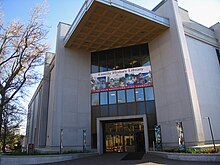User:Tea and crumpets/sandbox
- User:Tea and crumpets/Genealogy and reliable sources
- Genealogy in the Information Age: History's New Frontier?
- Naming Children in Early New England
- Genealogy

To replace FamilySearch collections and Indexing ancestral information. Needs citations.
Record locations[edit]
Genealogists may go online to find records, or travel to various locations. Many records of genealogical value, such as vital record certificates, family bibles, and genealogy books, are held in private homes. Genealogists may sometimes contact cousins to locate such records. Other records are located in libraries or archives. Many of the records from all of these locations have been digitized and posted online in various websites.
Governments, churches, public libraries, genealogical societies, and other organizations store records of genealogical value in archives. Some libraries are dedicated specifically to storing and providing access to genealogical records, with staff dedicated to helping patrons with research. One of the largest such libraries is the Family History Library in Salt Lake City, Utah, which houses over 2 million microfiche and microfilms of genealogically relevant material, as well as books and digital records.[1]

Several websites offer genealogical records, either in indexed or digitized forms. Some websites provide free access to records, while others require subscription fees. Examples of well-known fee-based websites include Ancestry.com, MyHeritage, and FindMyPast. Websites with free genealogical materials are often owned by governments, churches or nonprofit organizations, one of the most well-known being FamilySearch, the location of the digital records of the Family History Library in Salt Lake City. Volunteer genealogists also create their own webpages compiling record indexes, images of records, or genealogical data, sometimes using already existing platforms such as Rootsweb or Findagrave. Different websites contain different records. In order to do thorough research, genealogists must consult multiple types of records accessible at different locations and websites.
Education[edit]
Degrees, certificates, conferences, institutes, books, webinars, online courses, family history centers, community workshops
- ^ Donald Harman Akenson, Some Family: The Mormons and How Humanity Keeps Track of Itself Montreal: McGill-Queen's University Press, 2007; Johni Cerny and Wendy Elliott, The Library: A Guide to the LDS Family History Library. Salt Lake City: Ancestry Pub., 1988.

